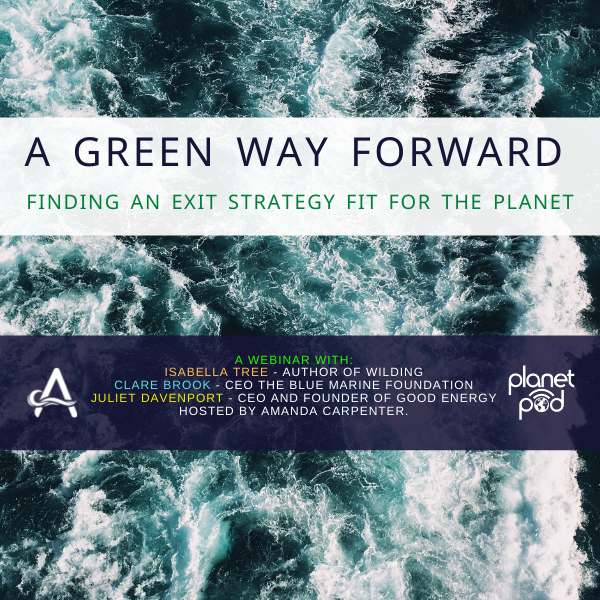Clare Brook, BLUE’s CEO, reflects here and in a panel discussion on how the world could emerge from the crisis of Covid-19 with a cleaner environment and a more fairly distributed economy.
‘It was the best of times, it was the worst of times,’ wrote Dickens about the French Revolution. While people all over the world are suffering fear, loneliness and economic hardship, there is a slim silver lining to this great cloud that hangs over humanity: Nature is rebounding, as is people’s appreciation of the natural world. From lions napping in the road in South Africa, to turtles nesting on once tourist-thronged beaches in Thailand, to birdsong everywhere, it seems as if the planet is breathing a sigh of relief because human beings are staying put for once.
Above all, it is a mistake to think that planetary health is a luxury that we can only think about when we’re in enforced lockdown or once we come out of this crisis. Because it was our abuse of nature that caused the crisis in the first place. Covid-19 is a zoonotic disease, in that it has come from animals to humans, as did SARS, raising questions as to why any trade in wild terrestrial creatures should be allowed to continue. We are destroying habitat at an unprecedented rate and so nature is biting back in unexpected ways. As the poet Horace said, if you attack nature with a pitchfork, she’ll come right back at you.
Once the disease was unleashed in human-to-human contact, latest research suggests that it was made far worse by air pollution. 78 per cent of the deaths in Italy, Spain, France and Germany occurred in the most polluted zones in those countries. Indeed, the Mayor of Milan has announced a dramatic rethink of Milan’s transport system as the city comes out of lockdown, with priority given to cycle and public transport at the expense of polluting cars. From Bogota to Beijing, people in the most polluted cities in the world are enjoying the cleanest air they’ve seen for decades. Air pollution, which is linked to an astonishing 4.2 million premature deaths worldwide a year, is something which people may well want to see the back of permanently.
Other changes which have come about through necessity during lockdown, but may become a permanent feature of life in future are more efficient, more environmentally friendly ways of working, which also suit people better. At the Blue Marine Foundation, we have been surprised and delighted by how high our collective productivity is, how well we all communicate, how creative everyone is. While we miss seeing each other in person, it’s unlikely that we’ll go back to the same levels of office attendance with the accompanying commute on crowded trains (who knows how long it is before that’s safe again) and inefficient use of time getting to places.
If commuting is going to see a reduction, then business travel surely cannot rebound to pre-Covid levels. Videoconferencing which is working so well in extremis could take the place of the majority of international meetings and conferences. The iniquity of policy makers flying all over the world to collectively wring their hands about climate change may finally become a thing of the past.
It is vital that environmental policy gets back on track soon (albeit via video link if need be), and environmental policing is sorely missed, particularly in the ocean where lawlessness has long since been the norm. While small-scale, sustainable fishers are going to the wall, industrial-scale fishing effort is continuing unabated, unobserved and therefore unchecked. Greater transparency and greater equality in food supply systems must be something that comes out of this crisis, along with a shortening of food supply chains.
Revolutions in human history are calamitous for those who live through them, but have often heralded in a new world order that benefits the majority of humankind. From the breakdown of feudalism after the Black Death to universal suffrage after the First World War and Spanish Flu pandemic, crisis has often given birth to progress.
But in this latest cataclysm facing the human race, it’s vital to understand that the best way out of the crisis is to recognise that we must build a cleaner, greener economy, because human health, planetary health are inextricably interlinked.
Click here to listen to the full panel discussion.
About the webinar “A green way forward – finding an exit strategy fit for the Planet”. Clare Brook, along with Isabella Tree, rewilding expert from the Knepp Estate and author of Wilding, and Juliet Davenport, CEO and founder of the 100% renewable energy company Good Energy share their thoughts and perspectives on what the immediate impacts of Covid-19 have been on the environment and business.



















